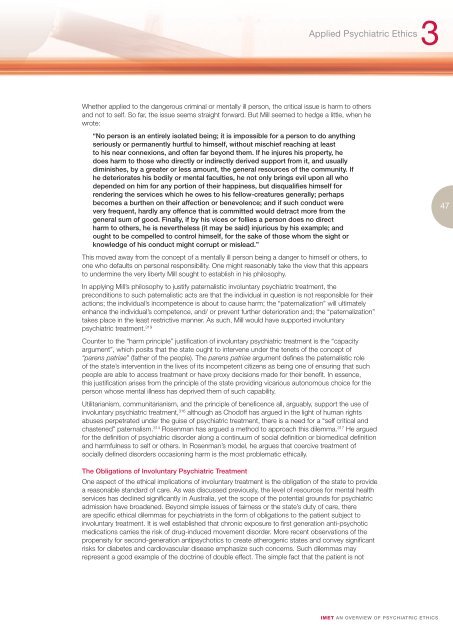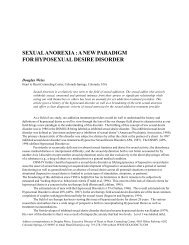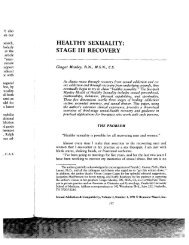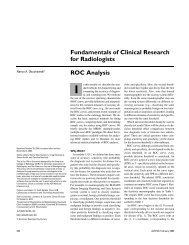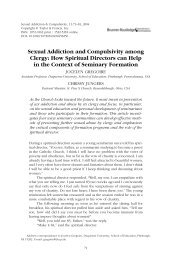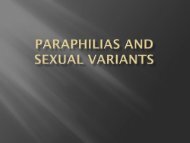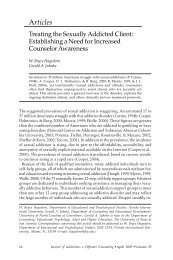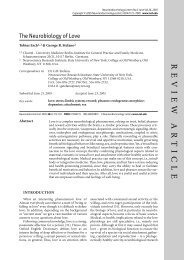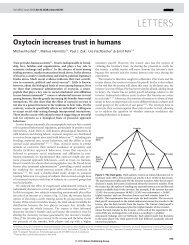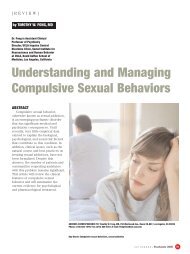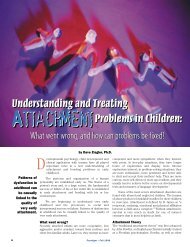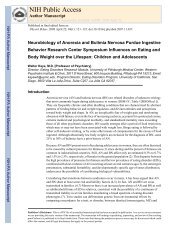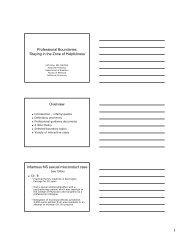An Overview of Psychiatric Ethics
An Overview of Psychiatric Ethics
An Overview of Psychiatric Ethics
You also want an ePaper? Increase the reach of your titles
YUMPU automatically turns print PDFs into web optimized ePapers that Google loves.
Applied <strong>Psychiatric</strong> <strong>Ethics</strong>3Whether applied to the dangerous criminal or mentally ill person, the critical issue is harm to othersand not to self. So far, the issue seems straight forward. But Mill seemed to hedge a little, when hewrote:“No person is an entirely isolated being; it is impossible for a person to do anythingseriously or permanently hurtful to himself, without mischief reaching at leastto his near connexions, and <strong>of</strong>ten far beyond them. If he injures his property, hedoes harm to those who directly or indirectly derived support from it, and usuallydiminishes, by a greater or less amount, the general resources <strong>of</strong> the community. Ifhe deteriorates his bodily or mental faculties, he not only brings evil upon all whodepended on him for any portion <strong>of</strong> their happiness, but disqualifies himself forrendering the services which he owes to his fellow-creatures generally; perhapsbecomes a burthen on their affection or benevolence; and if such conduct werevery frequent, hardly any <strong>of</strong>fence that is committed would detract more from thegeneral sum <strong>of</strong> good. Finally, if by his vices or follies a person does no directharm to others, he is nevertheless (it may be said) injurious by his example; andought to be compelled to control himself, for the sake <strong>of</strong> those whom the sight orknowledge <strong>of</strong> his conduct might corrupt or mislead.”47This moved away from the concept <strong>of</strong> a mentally ill person being a danger to himself or others, toone who defaults on personal responsibility. One might reasonably take the view that this appearsto undermine the very liberty Mill sought to establish in his philosophy.In applying Mill’s philosophy to justify paternalistic involuntary psychiatric treatment, thepreconditions to such paternalistic acts are that the individual in question is not responsible for theiractions; the individual’s incompetence is about to cause harm; the “paternalization” will ultimatelyenhance the individual’s competence, and/ or prevent further deterioration and; the “paternalization”takes place in the least restrictive manner. As such, Mill would have supported involuntarypsychiatric treatment. 319Counter to the “harm principle” justification <strong>of</strong> involuntary psychiatric treatment is the “capacityargument”, which posits that the state ought to intervene under the tenets <strong>of</strong> the concept <strong>of</strong>“parens patriae” (father <strong>of</strong> the people). The parens patriae argument defines the paternalistic role<strong>of</strong> the state’s intervention in the lives <strong>of</strong> its incompetent citizens as being one <strong>of</strong> ensuring that suchpeople are able to access treatment or have proxy decisions made for their benefit. In essence,this justification arises from the principle <strong>of</strong> the state providing vicarious autonomous choice for theperson whose mental illness has deprived them <strong>of</strong> such capability.Utilitarianism, communitarianism, and the principle <strong>of</strong> beneficence all, arguably, support the use <strong>of</strong>involuntary psychiatric treatment, 316 although as Chod<strong>of</strong>f has argued in the light <strong>of</strong> human rightsabuses perpetrated under the guise <strong>of</strong> psychiatric treatment, there is a need for a “self critical andchastened” paternalism. 314 Rosenman has argued a method to approach this dilemma. 317 He arguedfor the definition <strong>of</strong> psychiatric disorder along a continuum <strong>of</strong> social definition or biomedical definitionand harmfulness to self or others. In Rosenman’s model, he argues that coercive treatment <strong>of</strong>socially defined disorders occasioning harm is the most problematic ethically.The Obligations <strong>of</strong> Involuntary <strong>Psychiatric</strong> TreatmentOne aspect <strong>of</strong> the ethical implications <strong>of</strong> involuntary treatment is the obligation <strong>of</strong> the state to providea reasonable standard <strong>of</strong> care. As was discussed previously, the level <strong>of</strong> resources for mental healthservices has declined significantly in Australia, yet the scope <strong>of</strong> the potential grounds for psychiatricadmission have broadened. Beyond simple issues <strong>of</strong> fairness or the state’s duty <strong>of</strong> care, thereare specific ethical dilemmas for psychiatrists in the form <strong>of</strong> obligations to the patient subject toinvoluntary treatment. It is well established that chronic exposure to first generation anti-psychoticmedications carries the risk <strong>of</strong> drug-induced movement disorder. More recent observations <strong>of</strong> thepropensity for second-generation antipsychotics to create atherogenic states and convey significantrisks for diabetes and cardiovascular disease emphasize such concerns. Such dilemmas mayrepresent a good example <strong>of</strong> the doctrine <strong>of</strong> double effect. The simple fact that the patient is notIMET AN OVERVIEW OF PSYCHIATRIC ETHICS


